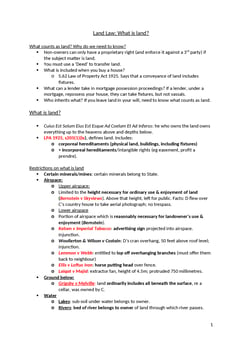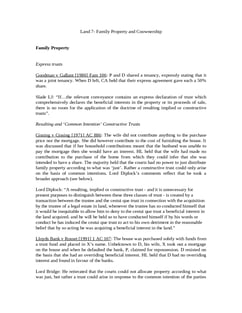Whitgift v Stocks [2001] EWCA Civ 1732
Judgement for the case Whitgift v Stocks
Table Of Contents
Plaintiff, a property developer, sold off a property to Defendant’s predecessor subject to restrictive covenants.
Plaintiff then wished to breach the restrictive covenants and Defendant resisted.
CA denied Defendant’s claim to enforce via annexation, but allowed it on the basis of the “building scheme” basis.
Jonathan Parker LJ
He gives definition of annexation and building scheme
A restrictive covenant affecting freehold land is enforceable between parties other than the original covenantor and the original covenantee if the party seeking to enforce it is entitled to the benefit of it and the party against whom it is sought to be enforced is subject to the burden of it.
Burden can exist if the covenantor’s successor had notice of it upon purchase.
Benefit can exist when the covenant “touches and concerns” the covenantee’s successor’s land and has been assigned to him personally or has been annexed to his land.
-
“Annexation” in this sense can only occur in circumstances where the land to which the benefit of the covenant is said to be annexed was in the ownership of the original covenantee at the date when the covenant was entered into.
Thus the effect of annexation in a case where the developer of an estate sells off the various developed plots subject to restrictive covenants is that the first purchaser will not be able to enforce the covenants entered into by the purchasers of any of the other plots, whereas the last purchaser will be able to enforce the covenants entered into by all the other purchasers.
In a scheme under which similar restrictive covenants imposed on a number of properties in a defined area are mutually and reciprocally enforceable as between the respective owners for the time being of those properties (commonly referred to as a “building scheme”), then the owner for the time being of each of those properties will be able to enforce the covenants against the owners for the time being of each of the other properties subject to the scheme.
Thus, in the case of an estate which is sold off by a developer in various plots, the owner for the time being of each plot will be able to enforce the covenants against the owners for the time being of all the other plots, regardless of whether such plots were sold off by the developer before or after his own plot.
For Further Study on Whitgift v Stocks

A collection of the best GDL notes the director of Oxbridge Notes (an O...
Need instant answers? Our AI exam tutor is here to help.
Ask questions 🙋 Get answers 📔 It's simple 👁️👄👁️
Our AI is educated by the highest scoring students across all subjects and schools. Join hundreds of your peers today.
Get StartedSimilar Cases
Related Product Samples
These product samples contain the same concepts we cover in this case.
| Land Law | Covenants Notes (14 pages) |
| GDL Land Law | Freehold Covenants Notes (14 pages) |
| Land Law | Restrictive Covenants Notes (38 pages) |

 Since 2010, Oxbridge Notes has been a trusted education marketplace, supplying high-quality materials from top achievers at universities like Oxford, Cambridge, LSE, Harvard, and Yale.
Since 2010, Oxbridge Notes has been a trusted education marketplace, supplying high-quality materials from top achievers at universities like Oxford, Cambridge, LSE, Harvard, and Yale.